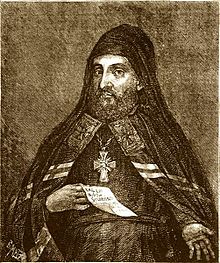You can help expand this article with text translated from the corresponding article in Polish. (December 2021) Click [show] for important translation instructions.
|
Meletius Smotrytsky | |
|---|---|
 | |
| Church | Roman Catholic Church Patriarchate of Constantinople |
| Metropolis | Ruthenian Uniate Church Kiev, Galicia and all Rus' |
| Diocese | Hierapolis (titular) Polotsk |
| In office | 1631–1634 1620–1629 |
| Predecessor | João da Rocha Herman Zahorskyj |
| Successor | Antonio Tasca Joasaph |
| Orders | |
| Ordination | October 1620 (bishop) by Theophanes III (Jerusalem) |
| Rank |
|
| Personal details | |
| Born | Maksym Herasymovych Smotrytsky c. 1577 |
| Died | 27 December 1633 (aged 56) Derman village, Volhynian Voivodeship, Poland (now Rivne Oblast, Ukraine) |
| Buried | Derman Monastery |
| Nationality | Ruthenian (Ukrainian) |
| Denomination | Eastern Orthodox later Ruthenian Uniate Church |
| Alma mater | Ostroh Academy Vilnius University (1600) |
Meletius Smotrytsky (Ukrainian: Мелетій Смотрицький, romanized: Meletii Smotrytskyi; Belarusian: Мялецій Сматрыцкі, romanized: Mialiecij Smatrycki Russian: Мелетий Смотрицкий, romanized: Melety Smotritsky Polish: Melecjusz Smotrycki; c. 1577 – 17 or 27 December 1633), Archbishop of Polotsk (Metropolitan of Kyiv), was a writer, a religious and pedagogical activist of the Polish–Lithuanian Commonwealth, and a Ruthenian linguist whose works influenced the development of the Eastern Slavic languages. His book "Slavonic Grammar with Correct Syntax" (1619)[citation needed] systematized the study of Church Slavonic. It became the standard grammar book in Russia until the end of the 18th century.[1]
- ^ The Cambridge Companion to Modern Russian Culture (2012). The Cambridge Companion to Modern Russian Culture. Cambridge University Press. ISBN 9781107002524.